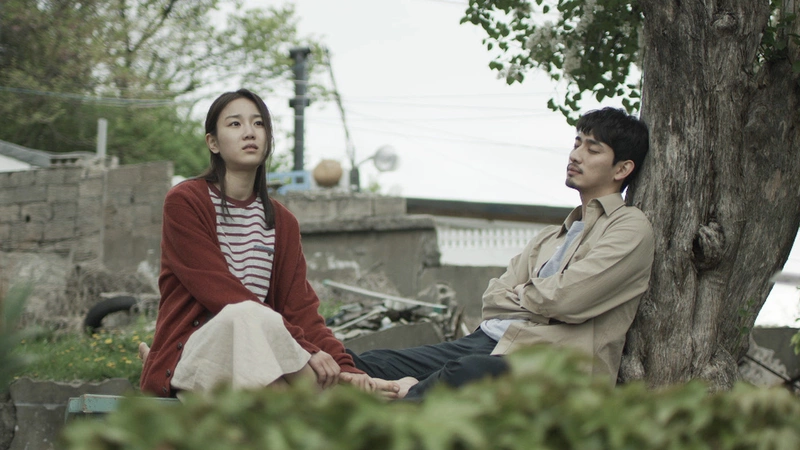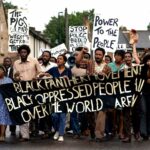The FilmSoc Journal is back for the 30th edition of the Raindance Film Festival, the largest independent film festival in the UK.
Elena Goh reviews Swallow (제비), a raw reflection on student rebellion and the complex, intergenerational narratives that inevitably follow.
Swallow (제비) is a South Korean historical drama, directed by Leesong Hee-il and featured at the Raindance Film Festival as its world premiere. Lee Ho Yeon (Woo Ji Hyun) is an overworked employee at his father’s construction company who is tasked with searching for his mother, Cha Eun Sook (Park Mi Hyun), after she goes missing. In doing so, he is forced to confront the ugly truths buried in his parents’ past. Therein unfolds a tale of love, betrayal, and political violence amidst the 1980s student protests that led to the Kwangju Uprising. What starts as a practical search for his mother becomes Lee Ho Yeon’s endeavour to understand the rebellion his parents were involved in, and eventually his struggle to understand his parents as human beings. Swallow won Best International Feature at Raindance and features quite a star-studded cast. Most of the main leads have been featured in prominent K-dramas (Yoon Park acted in Hello! My Twenties and Itaewon Class, and Woo Ji Hyun was in All of Us Are Dead) while Park So Jin is known as the leader of the K-Pop girl group Girl’s Day.
Given how they were released one after another, it’s difficult not to compare Swallow with Decision to Leave, and the line of South Korean cinematic giants that have just been released in the past few years. Stylistically, it is evident that Hee-il Leesong takes inspiration from Park Chan Wook’s films — the violence, the non-chronological structure, the continuous revisiting of a turning point from different perspectives as the truth becomes increasingly complicated. In that sense, the film is a successful imitation of these techniques. The result is an emotionally and ethically complex mystery that unfurls its tragic story, scene by scene, through a connected series of crafted visual motifs. Similar to Yim Soon Rye’s Little Forest, there is a clear juxtaposition between scenes in the countryside and those in the city; the countryside is associated with the student rebels’ innocence and sincerity, whereas the city breeds corruption and violence. This visual contrast creates cinematography which is emotionally charged in tone and detail, and the results are undeniably beautiful.

While all the love triangles and dubious paternity bordered on melodrama, the film provided a nuanced exploration of the cycles of systemic violence which can stretch into intergenerational trauma. With the sophistication of Arundhati Roy’s The God of Small Things, Swallow reflects on how political oppression and prolonged violence can cause victims to become abusers, and lovers to become traitors. When Lee Ho Yeon finds out the truth about his parents, he weeps because it is a hideous though important one, filled with cowardice and injustice and grief. And so, as Lee Ho Yeon faces his mother for the first time in the film, the audience understands that this reunion was the emotional core all along; a mother with a turbulent past, quietly hoping that her son will come to understand it.
What struck me, in particular, was the film’s presentation of the student rebels around 40 years after the rebellion. To some extent, student rebels in movies are easy to root for. They represent the underdog fighting against a heartless corporation, they’re young and passionate, and their idealism is infectious. Even if they lose, they win the audience’s sympathy. But Swallow rejects this black-and-white morality in its exploration of the kind of people they grow up to become. Despite the fact that they were all equally passionate in their youth, only a tiny minority stayed faithful to those unprofitable ideals. The rest became corrupt businessmen and congressmen, working to support the same institutions they had rebelled against while growing immensely wealthy through under-the-table dealings. One of the ex-rebels and now a congressman, right after reminiscing about his past, proceeds to illegally approve a business deal as a ‘friendly gesture’ to Lee Ho Yeon’s father. Seeing Lee Ho Yeon’s discomfort, he then smiles and says, “It’s ok, after all that, we deserve it.”

While the film handles emotional complexity masterfully, it is less successful with its pacing. Aside from South Korean cinema’s refreshing originality, I find that part of its appeal is its propulsive rhythm. Like Sorkin’s musical dialogue, there is always a kind of tempo in their sequences, sometimes backed by a killer soundtrack. In Swallow, this rhythm is created with footsteps. Both the sound and sight of them. Paired with a notably minimalistic soundtrack, tension builds and allows the orchestral swells in emotional scenes to feel even more momentous. The technique works, but it also leaves the film feeling rather bare. For over 2 hours the audience are required to track the film’s intricate details and motifs, but are left fatigued by the number of silent scenes and hallway shots. By the credits, it did feel like a very long movie. While Swallow managed to capture the emotional complexity of a Park Chan Wook film, I felt that it lacks the latter’s skill in efficient storytelling — cramming an extremely complicated story into a short space of time, in the most engaging way possible. While its slower, mellower tone can be said to resemble Zhang Yi Mou’s Under the Hawthorn Tree, the film as a whole didn’t seem to balance its explosive violence with its romance as well as it could have done, resulting in a pacing that was slightly off.
Nonetheless, Swallow tackles a complicated human drama within a controversial period of Korean history with grace and sincerity. Watching it in the wake of the Hong Kong student riots, the BLM movement and the Iranian protests, the film feels less like a historical drama and more like an urgent plea — to listen, and to understand the human story hidden in these movements, in all its painful complexity. Swallow makes me wonder about the stories that will emerge from our turbulent present, and whether we, as audiences and members of history, will have the courage to listen to them.
Swallow won Best International Feature at Raindance Film Festival 2022.




